russian colonialism 101: 5 whitewashing tactics.
the mythology that helps russian colonialism to stay unrecognized.
Russian Colonialism 101 is the first newsletter to shed light on Russian colonialism. The opening essay is public; the curated reading lists and community discussion threads on hidden colonial legacies are behind a paywall. This newsletter is part of the Volya Hub network, expanding global awareness of Russian colonialism.
If you will love this edition, please don’t forget to like, comment and share it so Substack algorithm starts loving my work.
This ad started like many other foreign social ads about Ukraine these days: a rapid-fire montage of war, destruction, and Ukrainian faces frozen in pain. It also included a heart-wrenching image of a Ukrainian father, hollow-eyed, who lost his wife and daughters in a recent Russian bombing of an apartment building in Lviv. The campaign had all the hallmarks of a heartfelt effort. It was even produced pro bono by a German creative agency.
So why did it leave so many Ukrainians furious?
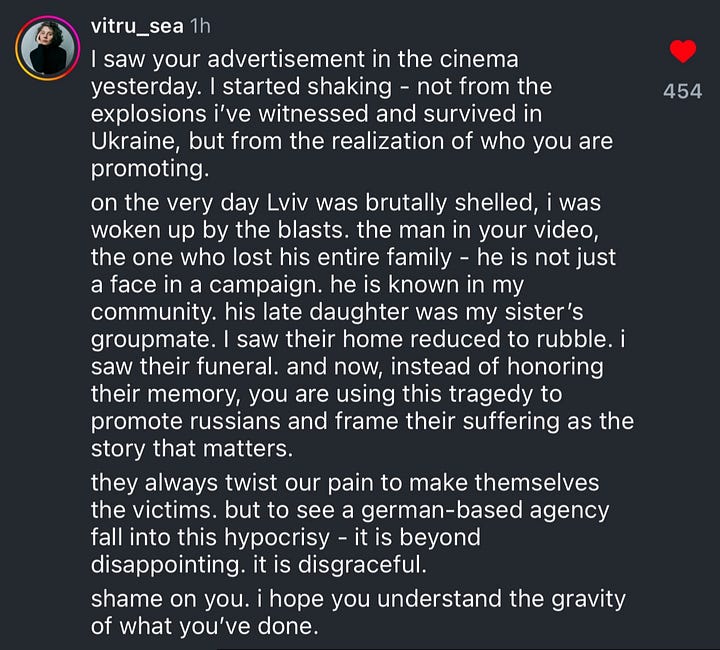
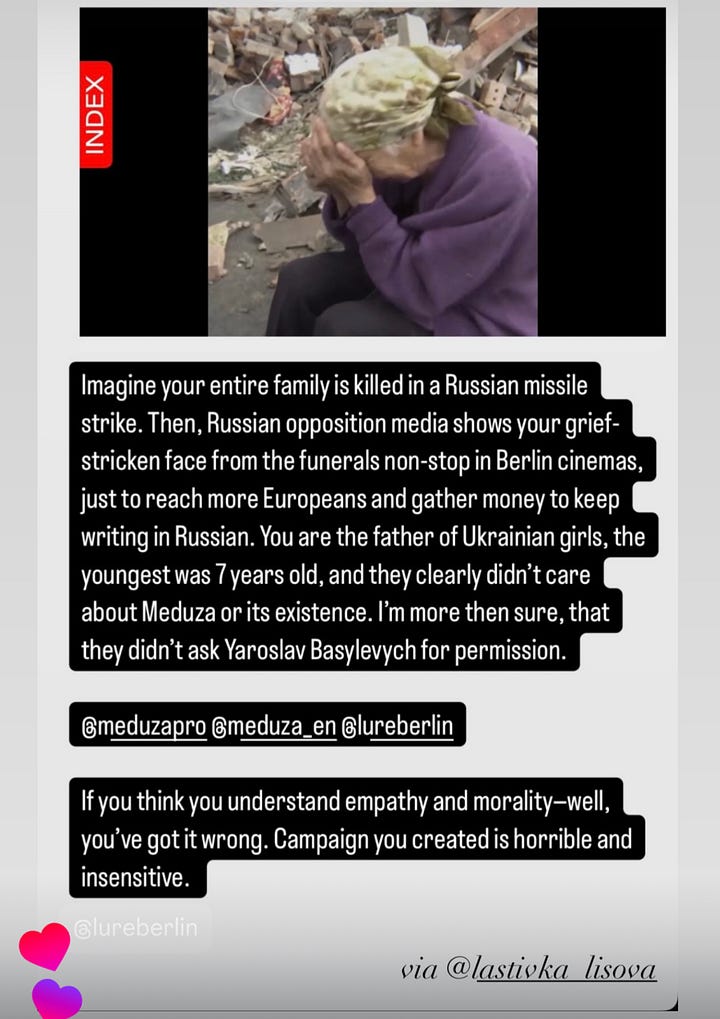
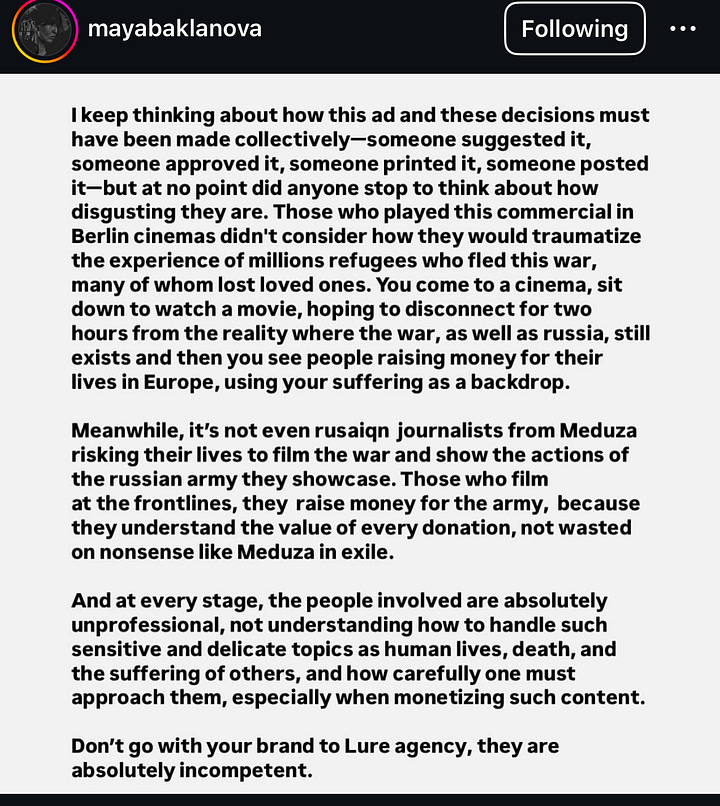
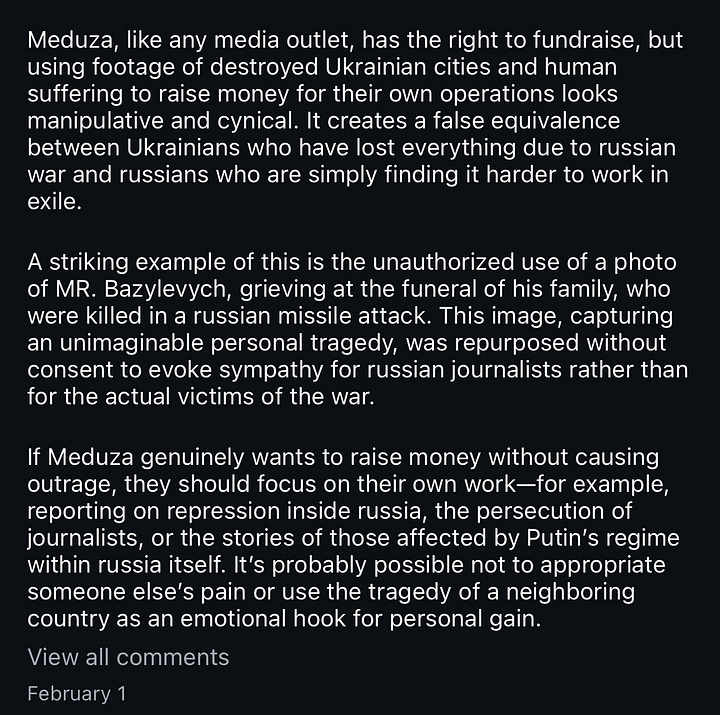
Because this ad wasn’t about solidarity. It was a marketing stunt to promote a well-funded Russian media brand operating from abroad. The agency had taken images of genocide—perpetrated by Russian society—and repurposed them to drive revenue for a Russian enterprise. By doing so, they reinforced the deeply flawed idea that Russians are equal victims in this war, deserving of the same sympathy as Ukrainians.
If that were true, why didn’t they show images of Russians suffering? Why didn’t they highlight Russian cities reduced to rubble by the war?
This is rhetorical, of course. It’s not the first time the Ukrainian tragedy has been repackaged as a backdrop for Russia-centered products.
A Non-Apology That Misses the Point
After public backlash, the agency pulled the campaign and locked its social media accounts. Apologies followed. But if you read them closely, they only express regret for hurting people’s "feelings" and acknowledge their "pain." Nowhere do they address the real issue: the glaring power imbalance in how Russian and Ukrainian stories are framed.
I’ve seen this happen hundreds of times over the past three years. And I’d bet that no one in that agency actually understood what they did wrong. They probably acted with good intentions, genuinely believing they were helping "another victim" of this war.
And here’s where the triumph of colonialism manifests—when bystanders fail to see the power imbalance between an abusive and an abused group.
Why am I spending so much time on this ad fiasco? It isn’t unique. In fact, it follows a pattern I’ve seen over and over again. Because Russian colonialism is invisible to many outside the region. And that’s not by accident. It is upheld by a set of well-crafted tactics that keep it hidden, unaccountable, and unchallenged. For centuries, Russian imperial propaganda worked tirelessly, so eventually, few outside of its former colonies were able to see Russian history—or even the actions of ordinary Russians—through the lens of colonialism. And so, no one is an abuser. Everyone is a victim. And accountability? It never even gets a chance to start.
This power dynamic is instantly spottable for anyone whose unlucky fate was to be born a Russian neighbor. We’ve developed almost an instinctive reflex for recognizing it. Here’s a quote from Dr. Azamat Junisbai, a Qazaq sociology professor, from our chat during the Matryoshka of Lies audio show:
In a society formerly colonized by Russia, the danger of Russian imperial revanchism is well known. The deep-rooted Russian colonial arrogance towards central Asians is instantly recognizable by Qazaqs, Uzbeks, and others. Unfortunately, in societies without direct experience of Russian occupation, awareness about Russia's history as a brutal, colonial power is often lacking. I would argue that successfully obscuring the reality of the Soviet Union as a ruthless, colonial power is one of the most amazing propaganda achievements in modern history.
For the rest is much harder to spot the same power imbalance. The reason? Russian colonialism operates on five deeply ingrained tactics that keep it invisible, unaccountable, and unchallenged. Let’s break them down.
Five Whitewashing Tactics of Russian Colonialism
1. Deny: "Colonialism is only what Western empires did in the Global South."
Russia says: “We have always been an anti-colonial power.”
Russia says: “We have nothing in common with Western imperialism.”
Russia says: “We are untouched by the "sin" of colonialism.”
In my Volya Hub video series, I explain that empire is not just about land grabs. It is about controlling identity—erasing or mutilating it to dominate. There’s a growing body of research suggesting that colonialism can take many forms. Even within the Russian empire, its manifestations range from Ukraine (where Moscow sought to erase and/or steal Ukrainian identity) to Qazaqstan (where Russian rule thrived on white supremacy and segregation). With settler colonialism remaining an enduring hallmark of Russia’s expansion.
For centuries, Russia has escaped scrutiny by exploiting the outdated Western idea that colonialism is only about transatlantic slavery or overseas conquest. But not all empires sailed in ships—some expanded on land, swallowing nations whole.
2. Gaslight: "Moscow is the only place to understand Russia."
Russia says: “Speaking Russian is enough to understand its neighbors.”
Russia says: “No culture in the region matches the "great Russian" one.”
Russia says: “Moscow is the sole intellectual authority east of Europe.”
The Iron Curtain was never just about the Soviet era—it was, and still is, about Russia’s colonial monopoly on knowledge. For centuries, Moscow has dictated how the world perceives the people it has colonized. It alone decided which histories were valid, which cultures mattered, and which voices deserved to be heard abroad.
This is how a distorted global knowledge of the Russian neighbors was crystalized through the prism of the colonizer. This is why every major Western academic institution has a “Slavic/Eastern Europe/Eurasian/Russian” department staffed with so-called "Russia experts"—and yet not one of them predicted the ongoing genocide in Ukraine. It’s why Russian imperial culture, dressed up as "Tolstoyevsky" greatness, has been globally romanticized while its origins—pillaged from the indigenous cultures Russia colonized—remain invisible.
The Iron Curtain never fully lifted. Moscow still gatekeeps history—and the world keeps listening to the abuser, not the abused.
3. Deflect: "Russia is the real victim. The world is Russophobic."
Russia says: “We bring civilization.”
Russia says: “We come to protect.”
Russia says: “We are only defending ourselves.”
In my Russian Colonialism 101 guidebook, I break down how Russia has used self-victimization to justify every act of aggression, from the 1911 invasion of Iran to the 1939 invasion of Finland, from the 2008 invasion of Sakartvelo (Georgia) to the ongoing war in Ukraine. When the world calls out its violence, successive Russian regimes had just one counter-argument: Russophobia. A term parroted not only by Putin but also by "opposition" white Russians who refuse to reckon with their country’s imperialism.
The backbone of Russian propaganda is whataboutism that deflects accountability by pointing at Western colonial crimes instead. But no one calls it a "hate crime" to critique the colonial legacy of British or French Empires. So why is there a different standard for Russia?
4. Reverse Victim: "Imperial Innocence."
Russia says: "The Tsar did it."
Russia says: "Stalin did it."
Russia says: "Putin did it."
There is a long and unbroken tradition in Russian society of blaming one leader for the empire’s crimes—while keeping the empire intact. Qazaq thinker Botakoz Kassymbekova calls this phenomenon imperial innocence:
"Russians expect loyalty from former Russian colonies, including knowledge of the Russian language, political alignment, and rejection of Western influence. Under this imperial view, Russian rule is not colonialism but a gift of modernity. It is a deeply altruistic act performed for backward people. Rejection of Russian cultural dominance, including building independent foreign policy and contesting the Russian view of Soviet history, is an act of political disloyalty… A search for independence triggers a sense of victimhood in Russia, as if disagreement with the Russian imperial self-image is an attack on Russian cultural greatness."
The imperial innocence myth is the ideological backbone that connects various Russian regimes throughout history in their continuous and shared push to preserve Russian colonial domination. It also kept Russian imperial propaganda consistently on message, even with the never-ending change of what it likes to call itself: a tsardom, an empire, a union, a federation. Every Russian regime has relied on this myth to dodge accountability. Each time power changes hands, the empire resets: "That was the past. This is a new Russia." It is one of the most effective damage-control strategies in history.
5. Offend: "Russian colonialism is a conspiracy to badmouth Russia."
Russia says: "Our country came together in friendship and hugs."
Russia says: "No one ever complained about being ruled by us."
Russia says: "Evidence of our crimes is fabricated."
After over a decade of researching Russian colonialism, I’m still struck by the sheer lack of visual documentation of its crimes. Entire nations—like the Qırımlı or Kalmyks—were deported overnight in the 1940s, yet finding photographic or video evidence is nearly impossible.
Why?
Because erasing history is a core pillar of Russian colonial success. We see it happening in real-time today in occupied Ukraine— where Moscow burns Ukrainian books, replaces them with Russian ‘great literature’, loots museum artifacts, kills Ukrainian intellectuals. When your history is erased, it becomes easier for the empire to decide who you are.
For decades, Moscow has framed itself as an anti-colonial power, using Soviet-era rhetoric to position Russia as a liberator rather than an oppressor. Today, it pushes the idea that any critique of its imperialism is just Western propaganda, hijacking anti-colonial discourse to shield its own expansionism. Yet the same Russia that condemns "Western colonialism" continues to genocide, exploit, and pillage indigenous lands from Ukraine to Northern and Central Asia. Anti-colonialism isn’t just about opposing the West—it’s about opposing all empires. And Russia remains the world’s most enduring one.
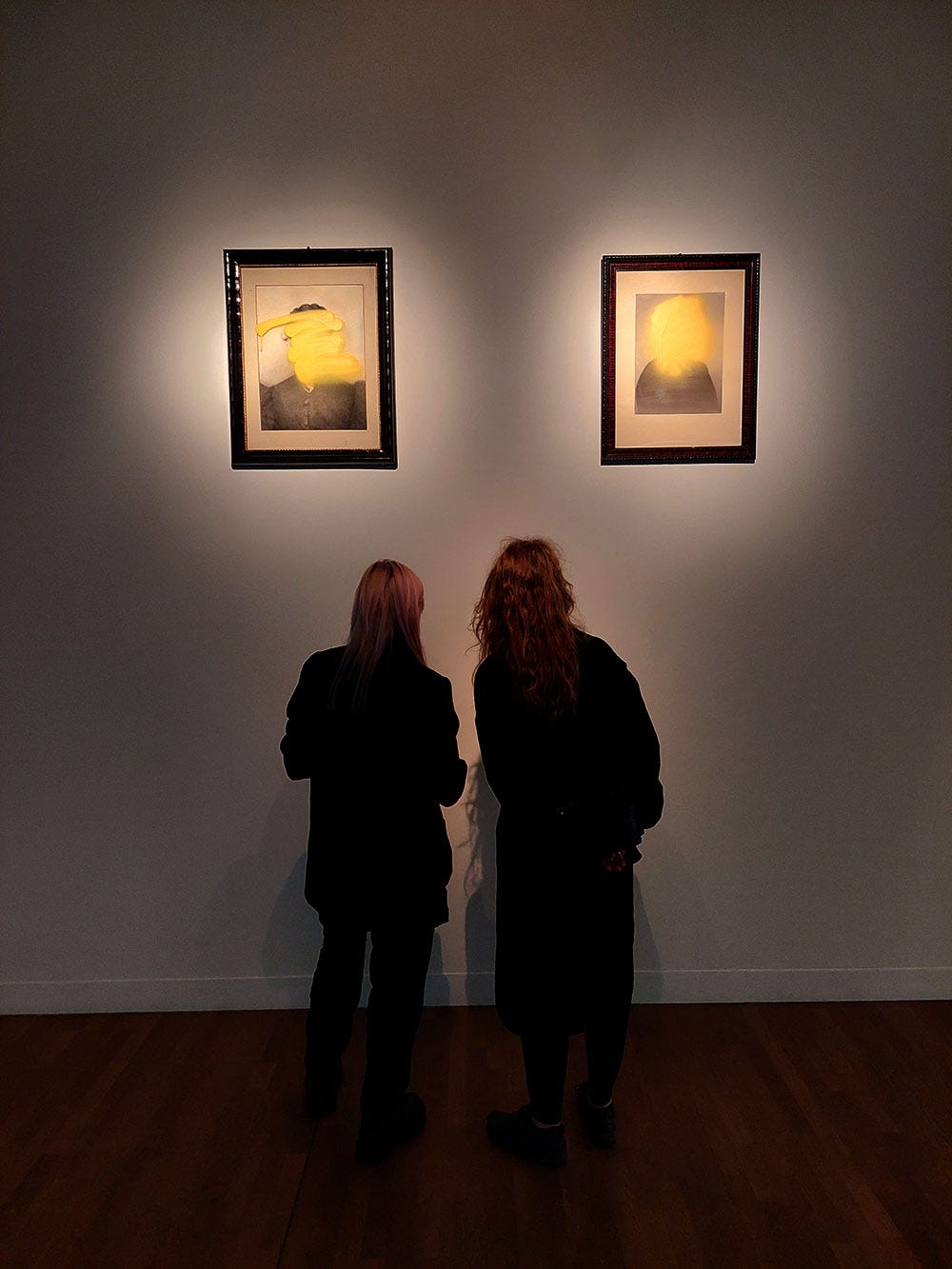
NEW EXCLUSIVE FEATURE: "ASK ME ANYTHING" (PAID MEMBERS ONLY)
Got questions? Want to dive deeper into a specific aspect of Russian colonialism? I’m introducing a subscriber-exclusive "Reader Q&A" section.
Send in your questions via paid subscribers chat—from historical myths to modern geopolitics.
For every edition, I’ll tackle one in depth.
Available only to paying members on Substack and Patreon.
REMINDER: founding subscribers to my Substack and members of the highest tier on my Patreon have access to the Russian Colonialism 101 micro-website — the only live-updating database with the most relevant sources about Russian colonialism.
here is what's in store for you this week:
Is it okay to keep listening to Tchaikovsky and other prominent Russian composers of the past? Is their art has anything to do with Russian imperialism?
How Russians proudly continued the Nazi legacy after taking over some of the Holocaust death camps;
The most famous Christmas song can teach you more about Russian colonialism than you would expect;
Even among ‘opposition’ Russians in exile, the myth of Russian cultural supremacy lives on.
“Russian society tends to understand its relation to postcolonialism only in terms of victimhood rather than the perpetuation of colonialism, despite being the most durable empire of all time.” A powerful essay by a rising academic star.
curious for more? let's go.



